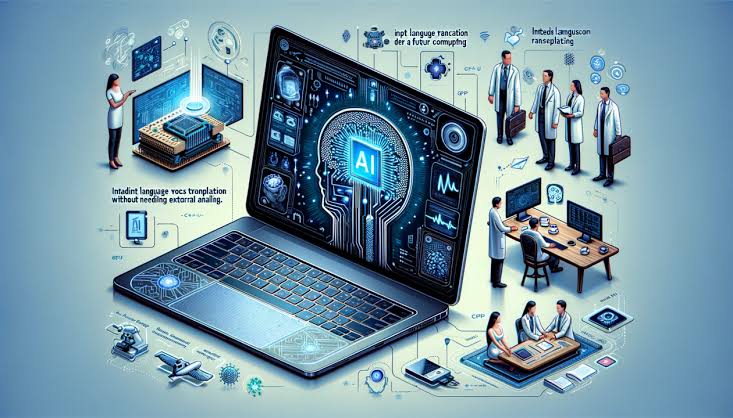Artificial Intelligence (AI) has significantly reshaped the landscape of technology. It profoundly influenced the performance capabilities of laptops and PCs across various tasks. These range from basic computations to intricate machine learning algorithms. This article explores how AI has transformed the performance dynamics of these devices. It will examine both the advancements and challenges encountered in this rapidly evolving field.
Artificial Intelligence encompasses spectrum of technologies that simulate human intelligence processes. In the realm of laptops and PCs AI manifests through hardware and software integrations. These integrations aim at enhancing performance. They automate tasks and refine user experiences.
AI's impact on laptop and PC performance starts with hardware innovations. Modern processors. Graphics cards now come equipped with AI accelerators such as neural processing units (NPUs) and tensor processing units (TPUs). These specialized chips are designed to handle AI workloads more efficiently than traditional CPUs and GPUs. They enable faster data processing improved multitasking capabilities and enhanced energy efficiency.
For instance, Intel has integrated AI-powered processors that use deep learning algorithms to optimize performance in tasks like image and speech recognition. NVIDIA's GPUs incorporate tensor cores that accelerate AI computations, making them ideal for applications requiring complex mathematical calculations and deep learning training.
Enhanced User Experience and Personalization
AI enhances user experiences on laptops and PCs through personalized recommendations, predictive analysis, and intelligent automation. AI algorithms analyze user behavior, preferences, and usage patterns to customize interfaces, suggest relevant content, and automate routine tasks.
Voice assistants like Cortana, Siri, and Google Assistant utilize natural language processing (NLP) to understand and respond to voice commands, offering hands-free operation and enhanced accessibility. AI-driven predictive typing features anticipate user input, enhancing typing speed and accuracy. Moreover, AI-powered security features on laptops use behavioral analysis to detect anomalies and prevent unauthorized access, thereby enhancing data protection.
AI in Software Optimization and Performance Boost
AI also plays a crucial role in software optimization, significantly improving laptop and PC performance. AI algorithms optimize software applications by allocating system resources more efficiently, reducing latency, and improving responsiveness. This optimization is particularly critical in gaming laptops, where AI dynamically adjusts graphics settings based on gameplay demands, ensuring smooth frame rates and immersive gaming experiences.
Furthermore, AI-driven performance monitoring tools analyze system metrics in real-time to identify bottlenecks and inefficiencies. These insights enable proactive maintenance, preventing system slowdowns and enhancing overall device performance over time.
AI for Energy Efficiency and Battery Life
AI contributes to improved energy efficiency and extended battery life in laptops and PCs. AI algorithms optimize power consumption by dynamically adjusting CPU and GPU frequencies based on workload demands. This adaptive power management ensures efficient resource allocation, reducing energy consumption during idle periods and extending battery runtime.
Additionally, AI-based predictive analytics forecast battery usage patterns and suggest optimizations to prolong battery lifespan. Machine learning models analyze historical data to predict battery degradation, prompting users to replace batteries before performance declines significantly.
Challenges and Considerations
Despite its transformative benefits, integrating AI into laptops and PCs presents challenges. Privacy concerns arise from AI's data collection practices for personalized services, necessitating robust data protection measures and transparent user consent policies. Compatibility issues between AI-driven software and legacy systems may require updates or system upgrades to fully leverage AI capabilities.
Moreover, AI's computational demands can strain hardware resources, leading to increased device temperatures and potential thermal throttling. Effective thermal management solutions are essential to maintain optimal performance and prevent overheating in AI-enabled laptops and PCs.
Future Trends in AI and Laptop/PC Performance
Looking ahead, AI's influence on laptop and PC performance will continue to evolve with advancements in AI algorithms, hardware integration, and software applications. Future trends include:
- Edge AI: AI processing moving closer to edge devices, reducing latency and enhancing real-time responsiveness.
- AIoT Integration: Integration of AI with Internet of Things (IoT) devices, enabling seamless connectivity and data exchange.
- AI-driven Healthcare and Education: AI applications in healthcare diagnostics, personalized learning platforms, and virtual assistants.
Conclusion
In conclusion, AI is reshaping the performance capabilities of laptops and PCs, driving innovations in hardware acceleration, software optimization, energy efficiency, and user experience. As AI technologies advance, their integration into laptops and PCs promises smarter, more efficient computing experiences, paving the way for future technological advancements and enhanced productivity in various sectors. Embracing AI's potential while addressing associated challenges will be crucial in maximizing its benefits for users and organizations globally.
